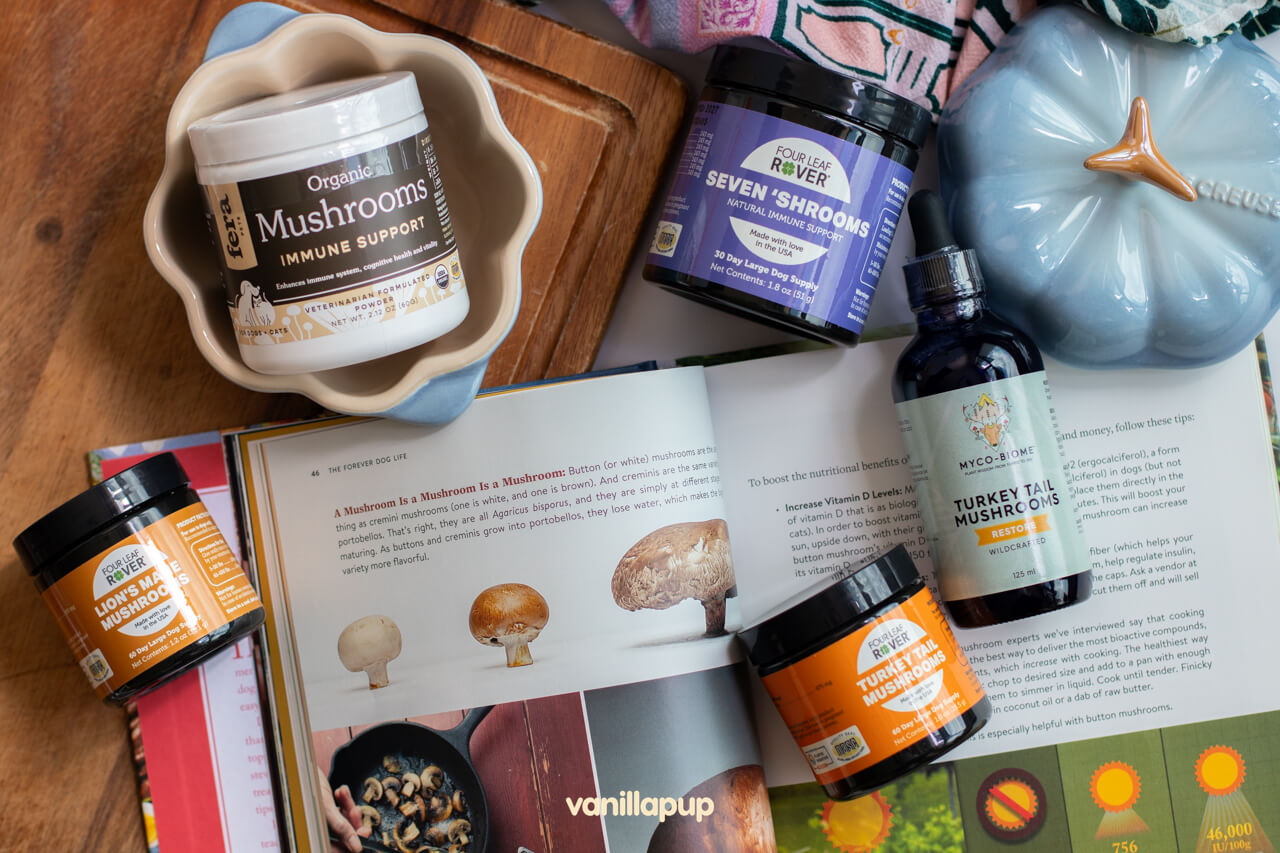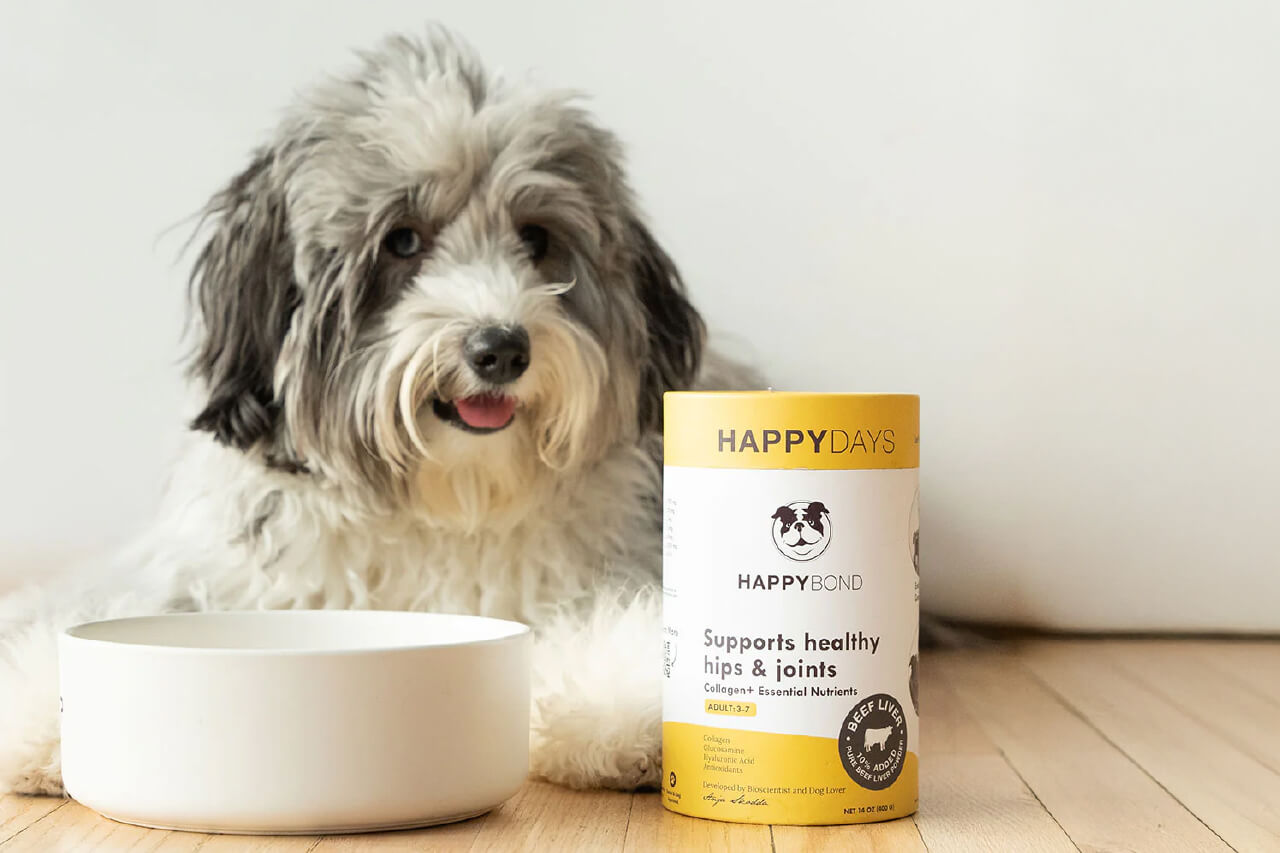Are mushrooms categorised as vegetables? While this may be a common search item, the real question for dog owners is whether or not your pet can consume them safely.
Good news is, not only are these fungi edible, they are also extremely beneficial and may even promote longevity! These small but mighty ‘creatures’ contain polyphenols, glutathione, polyamines, and ergothioneine that may help increase their lifespan, together with immune boosting beta-glucans.
The general guidelines are as follows: mushrooms that are safe for human consumption, are safe for your dog too.
Wild mushrooms found outdoors or in your backyard though, should be avoided as they may contain toxic compounds. Though not all of them are deadly, we always advise to err on the side of caution as some can cause serious cases of seizures and abdominal pain. If ingested by your pet, please monitor them closely - head to the nearest emergency vet if symptoms occur.
Parts of a mushroom
While we are familiar with what they are, not all of us are gurus when it comes to dissecting them. In order to understand how our pets can benefit from these mushrooms, we need to know what it consists of. This information will come in handy in the later parts of this blog where we explore supplements.

Mycelium - also known as the ‘roots’ of the mushroom underground
Fruiting body - refers to the whole mushroom itself that grows above ground
Cap - also known as the pileus that refers to the cap-like part or umbrella of the fruiting body
Gills/pores - found underneath the cap to produce and disperse spores for reproduction
Typically, the fruiting body is what we are looking out for and offers your dog the most nutrients.
With its legend spanning centuries, mushrooms are not only prized ingredients in the kitchen but are also known to be used as medicine for thousands of years even in Ancient Rome and Greek history. In this particular edit, we will be focusing on medicinal mushrooms, otherwise also known as adaptogenic mushrooms.
What are adaptogenic mushrooms?
Adaptogenic mushrooms are potent antioxidant powerhouses and nutrient dense organisms that help one better resist and fight the negative effects of stress and free radicals. A superfood for your superpup, if you will.
While these mushrooms were often misunderstood in the past, holistic nutrition is transitioning into the norm, resulting in them becoming more readily available. These adaptogenic mushrooms help your pup to adapt to both internal and external stimuli, alongside regulating a variety of biological processes.
At a glance, these medicinal mushrooms can benefit your dog in the following ways:
-
Fight against viruses and harmful bacteria
-
Support liver health
-
Balance blood sugar
-
Prevent inflammation
-
Wrestle chronic inflammation (especially in the brain)
-
Promote a healthy gut microbiome
-
Lower risk of cancer
-
Reduce anxiety and depression
Noteworthy adaptogenic mushrooms
However, it is important to note that not all mushrooms are adaptogenic. The most common ones you can find are Turkey Tail, Reishi, Cordyceps, Lion’s Mane, Chaga, Shiitake, Maitake, Phellinus, and Oyster mushrooms, which we will explore in more detail below.
1. Turkey Tail Or Yun Zhi
Known for its eye-catching appearance and colourful, overlapping fan-like structure that resembles that of a turkey’s tail, these mushrooms do more than just sit pretty. Dubbed a miracle superfood, the biggest advantage of Turkey Tail mushrooms (scientifically known as Coriolus versicolor / Trametes versicolor) lies in its ability to fight cancer and increase immunity.
Turkey Tail mushrooms contain a ton of antioxidants and a key cancer-fighting polysaccharide called Beta-glutans or β-glucans that strengthens the immune system. The ones we love are Polysaccharide-K (PSK) and Polysaccharide Peptide (PSP), which are both active compounds found in Turkey Tail mushrooms.
Fights cancer
Turkey Tails can do wonders for dogs diagnosed with Hemangiosarcoma (HSA) - a highly malignant cancer of the blood vessels that affects the spleen, heart, lungs and liver - as it slows down its growth.
Improves gut health
Turkey Tails contain prebiotic fibres that improves the gut microbiome and is scientifically proven to be a potent prebiotic to aid digestion, fight bacteria and increase nutrient absorption.
Reduces inflammation
Cytokines are proteins in the body that help fight against inflammation. When produced in excess, it can lead to autoimmune diseases and more infection. Turkey Tails can help inhibit the production of some cytokines, which can in turn reduce inflammation and flare-ups.
2. Reishi
Another valuable addition to your dog’s diet is Reishi (LingZhi) mushrooms. Often dubbed as the “mushroom of immortality”, these tiny organisms contain over 140 triterpenes each such as ganoderic acids, sterols, and lucidenic acids that support your pet's physical and mental well being.
Fights cancer
Reishi is packed with beta-glucans that strengthens and stimulates the immune responses against cancerous cells.
Reduces inflammation and regulates immune system
Thanks to its brimming content of triterpenes which are known for their incredible anti-inflammatory, antimicrobial, and antiviral properties, reishi mushrooms help ensure normal functioning of the immune system, including the elimination of foreign bodies. Reishi can also help with promoting optimal health of your dog on a cellular level.
Supports cardiovascular health
Reishi is a natural resource to enhance healthy heart function and cardiovascular health thanks to high levels of triterpenes present.
Relieves anxiety
Cortisol levels increase when your pup is stressed. A reishi miracle broth for them can help with anxiety as it lowers their cortisol and keeps them calmer.
3. Cordyceps
These fungi are known for their amusing appearance and striking orange exterior that resemble lanky fingers. Famous for their medicinal properties, cordyceps are a familiar ingredient often used in herbal soups and steamed chicken dishes in Chinese cuisines.
Supports immune system
Cordyceps help increase your pup’s ability to fight off infections or diseases by strengthening and regulating the immune system.
Increases respiratory health
Often used in traditional Chinese medicine as a tonic to soothe the lungs to treat fatigue and respiratory diseases, cordyceps can also improve respiratory function in dogs.
Improves endurance and stamina
Got an athletic pup training for the dog-lympics or one who just loves long distance running with you? Cordyceps can also help improve endurance and stamina in active dogs.
4. Lion’s Mane or Yamabushitake
Another hot favourite among dog owners are the lion’s mane mushrooms as it helps promote longevity and is especially beneficial for senior dogs. They look fuzzy on the exterior with long extended hair-like ‘mane’ that resembles that of a lion, hence its name.
Encourages nerve regeneration
Lion’s mane mushrooms can help stimulate nerve growth factor (NGF) for nerve support and repair for dogs that experience nerve damage, lameness or neuropathic pain resulting from injury or disease.
Improves cognitive impairment
In some cases, senior dogs might experience canine cognitive dysfunction syndrome (CCD or CDS) that may lead to a decrease in awareness, memory, learning, responses to stimuli and cognitive function. Lion's mane is a powerful miracle food that can help alleviate these symptoms and bring back alertness and an improved mood.
Stimulates neuron growth and reduces anxiety
Lion’s mane mushrooms have compounds known as Erinacine and Hericenone that promote the growth of nerve cells to improve brain and nervous system in aged dogs. They are also linked to improving a dog’s mood, including self-regulation during anxious bouts and helping with a more balanced emotional state.
5. Chaga
Chaga mushrooms are mostly found on the bark of birch trees and often resemble a pile of dirt. However, don’t be fooled by its exterior! Underneath lies a bright orange cross section that has multiple potent health benefits for your pup.
Prevents diabetes and supports organ health
Chaga contains trace amounts of naturally occurring iodine and high amounts of polysaccharides, such as beta-glucans and polyphenols, that can help lower blood sugar and ensure normal functioning of the pancreas.
Above all, it also helps to prevent liver inflammation, slows chronic issues and oxidative stress within the organ.
Slows ageing
Chaga mushrooms are chock-full of antioxidants that fight oxidative stress and free radicals, the culprit of accelerated ageing. An imbalance will also result in heart and joint issues. The antioxidant powerhouse that is this mushroom includes helpful antioxidants like triterpenoids, polyphenols and flavans to fight off stressors.
Improves gut health
Polysaccharides present in the mushroom helps regulate gut microbiota and ensures good bacteria flourishes for a healthy gut and therefore unlocking overall health.
6. Shiitake
The most familiar among all, the shitake is easily recognisable by its brown umbrella cap and stocky stems.
Boosts heart health, lowers cholesterol, and fights gastric cancer
Shiitake contains the bioactive substance lentinan that enhances immune function, supports heart health, and slows the growth of tumours. It is also especially helpful in terms of fighting gastric cancer. Beta-glucans present in shiitake mushrooms promote blood circulation and support heart function, resulting in an overall better cardiovascular health.
Helps digestion
These mushrooms contain up to 30 varying enzymes that help your pup better digest food such as carbohydrates. Dogs who are on a high-starch diet like kibbles would also benefit from having shiitake in their diet.
Alleviates allergies
As shiitake helps to boost the immune system, they can help your pup combat allergies with less itching and inflammation.
7. Maitake
A bunch of fungi that grows in a rippling fashion and resemble the feathers of a peacock, maitake are known as the ‘dancing mushroom’. This is because gatherers would dance with joy upon discovering it on their hunt due to its exceptional medicinal and healing properties. It is also considered one of the most potent in slowing cancer growth in the mushroom realm.
Fights cancer
Maitake contains a substance known as D-fraction, which is a potent anti-tumor and immune-boosting polysaccharide. It can slow the growth of tumours and increase the dog’s ability to fight cancer.
Reduces glucose levels
Maitake also has the presence of alpha-glucans that influences glucose and insulin metabolism to reduce and better manage glucose levels. This is especially helpful for dogs with diabetes.
8. Phellinus Or Sanghuang
Phellinus mushrooms are bitter-tasting and are yellow or orange in appearance. They typically grow on mulberry trees and are known for their medicinal properties.
Serves as antibiotics
Phellinus mushrooms have antibacterial and antimicrobial properties, which can even serve as a natural antibiotic for your pup by fighting infections.
Supports joint health
Phellinus also contains proteoglycans that are anti-inflammatory, which support joint health and mobility.
9. Oyster Mushrooms
Delicious and incredibly beneficial for health, oyster mushrooms are usually broad, fan-shaped and grey with a satisfying bite.
Reduces blood pressure and supports immune system
Pleuran, one of the bioactives and a type of beta-glucan fibre in oyster mushrooms, can benefit lung health and stimulate the immune system to fight infections and cancer.
Slows ageing
Oyster mushrooms are rich in phenolics, which have high antioxidant properties that can also decrease blood pressure.
How do you incorporate them into your dog’s diet?
Planning to get some mushrooms into your pup’s bowl? There are 2 main ways to do so:
-
Fresh, store bought
-
Supplements
Store-bought
Can’t resist their puppy eyes as they watch you gobble down your meal? Before you share them, take into consideration the following.
As raw mushrooms are difficult to digest, always make sure they are thoroughly cooked to prevent digestive upset. The cooking process also helps release the nutrients to be absorbed by your pup and inactivates a potentially toxic substance known as monomethyl hydrazine.
Typically, you can make a ton of recipes for your dogs out of mushrooms alone. Some include:
-
Boiling in water to make broth or tea
-
Sautéing in a pan
-
Filling up ice cube trays with broth from boiled mushrooms as frozen treats
-
Dehydrated
-
Grilled
Always feed your pup the cooked mushrooms as is in bite-sized pieces (to avoid choking), or with ingredients that are safe for your pup. For picky eaters, you can add coconut oil or a dab of raw butter for some flavour. Start with a small amount and gradually introduce it into your pup’s diet; always feed in moderation.
Also, consider keeping the stems too! They contain twice as much digestion-aiding fibre and immune-boosting beta-glucans compared to the caps itself. In addition, the stems can better regulate insulin, reduce inflammation, and support the gut.
Mushroom supplements

Apart from being culinary staples in its raw form, mushrooms can also come in the form of supplements. Though they can be store-bought, mushrooms in supplement form can target multiple issues at once (if it consists of a blend) and its nutrients are more bioavailable through the extracting process.
Choosing wisely
It is important to know what goes into the products you’re getting for your pets. Remember when we discussed the various parts of a mushroom earlier?
Here is where it comes in handy. While both the fruiting body and the mycelium contain beneficial bioactive compounds, they are more abundant in the fruiting body.
What's more, because mushrooms are generally expensive to grow, some manufacturers use a more economical way to grow them by using the mycelium. They are often placed in bags of grains and rice and cultured in a dark locker.
When they are ready for use, the mycelium is then grounded with the grains. This may result in a final product that is high in starch; which is not so good for our pets.
When it comes to choosing the right supplements, opt for one with the following:
-
High beta-glucan content
-
Uses the whole mushroom, including the fruiting body
-
Grown on natural substrates like wood
-
Low in pesticides and tested for heavy metals
-
Low in starch
It is also worthy of note that a high polysaccharide content ≠ healthy. Anything with a high starch content will also be reflected as high in polysaccharides.
Can dogs be allergic to mushrooms?
The short answer is yes. Dogs, like humans, have differing needs and allergy charts. Some might have more tolerant builds, whereas others may be more sensitive. Whenever introducing something new into your pet’s diet, always do it gradually to prevent GI upset.
If you suspect your dog is having an allergic reaction to dog-safe mushrooms, please seek veterinary attention immediately. Some signs to look out for are:
-
Swelling
-
Itching
-
Salivating or drooling
-
Vomiting
-
Difficulty breathing
Final thoughts
We understand that the variety of choices within the market can be daunting. We chose and handpicked the best for your pup so you have all the information you need in one place. Shop our range of mushroom supplements below.
Four Leaf Rover Seven ‘Shrooms
Four Leaf Rover Turkey Tail Mushrooms
Four Leaf Rover Lion’s Mane Mushrooms
Fera Pets USDA Organic Mushroom Blend for Immune Support
Myco-Biome™ by Adored Beast Turkey Tail Mushroom | Liquid Double Extract
Myco-Biome™ by Adored Beast Chaga Mushroom | Liquid Triple Extract
Roots by Adored Beast The Wolf
Written by Georgia Lam
Georgia is both a marketer and a writer at Vanillapup. In her free time, she writes for local magazines, specialising in beauty and lifestyle. She also has an apricot Maltipoo that serves up an attitude with the personality of a feline, but we love her and her stinky paws all the same.



